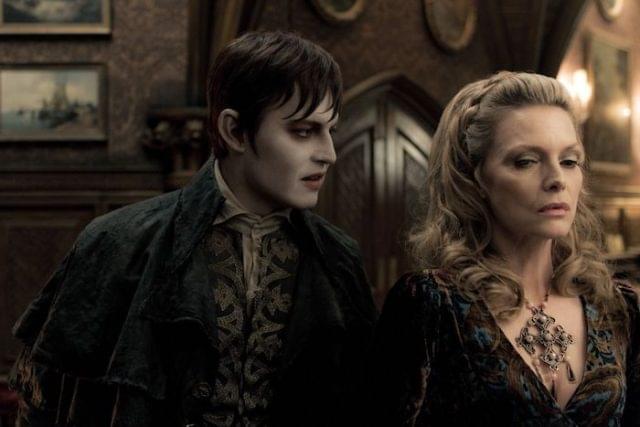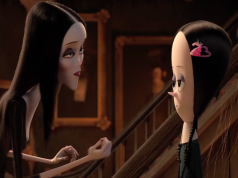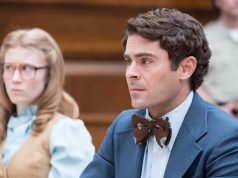
Tim Burton and Johnny Depp are known to be huge fans of two things: each other, and the old ABC daytime soap opera Dark Shadows. The supernatural series ran on weekday afternoons from June 1966 to April 1971, racking up 1,225 episodes and entertaining millions of viewers with its Gothic tales of vampires, ghosts, time travel, and shoddily constructed sets. It’s easy to see why Burton and Depp would be fans of it, and easy to see why they’d be considered the perfect team to adapt it into a film.
But this thing they came up with — what is this? This is tiresome, meandering piffle. I care not a whit for the sanctity of the original series (which I’ve never seen), but surely its fans won’t like the slick, comical tone of Burton’s version: as far as I can tell, apart from the character names and some plot elements, almost none of this resembles the old soap opera. Written by first-timer Seth Grahame-Smith — whose novel Abraham Lincoln: Vampire Hunter is about to become a movie — this Dark Shadows can’t decide whether it’s a parody, a horror comedy, an atmospheric melodrama, or a tedious bucket of crap. Eventually it chooses the last one.
Depp plays Barnabas Collins, an England-born, Maine-raised scion of a wealthy fishing-industry family who, in 1775 or thereabouts, was turned into a vampire and buried alive. He is unearthed in 1972 to find that the Collins family still inhabits the gorgeous Collinwood mansion, but that they are no longer the town’s most prominent citizens. Their business has been usurped by a rival cannery run by Angelique Bouchard (Eva Green), who is 1) a witch and 2) the very witch who killed Barnabas’ fiancee and cursed the poor fellow with vampirism 200 years earlier. Barnabas is thus especially motivated to help the Collinses regain their fortune.
The family’s matriarch, Elizabeth (Michelle Pfeiffer), is at first the only one who knows that Barnabas is a vampire from the 1700s; everyone else is told he’s a distant relative from England. This leads to several unbearable moments where Barnabas, making no attempt to conceal his true nature, says something vampire-y or 1700s-y, followed by Elizabeth hastily improvising an explanation, like it’s Three’s Company or something. All of that is lame, but I did get a few laughs from Barnabas’ incongruously refined manner of speech, particularly when he’s confused by a modern device. (“Show yourself, Satan! Mock me not with your strange luminance!” he says to a car’s headlights.)
Elizabeth’s 15-year-old daughter, Carolyn (Chloe Grace Moretz), is a brooding wannabe sexpot. (Suggestion for Burton: try not to sexualize your 15-year-old actresses so much! Thanks!) Elizabeth’s brother, Roger (Jonny Lee Miller), sticks around long enough for the movie to check him off the list, then vanishes. Roger’s son, 8-year-old David (Gulliver McGrath), sees ghosts. (Suggestion for screenwriter: since the story has no use for Roger, delete him from the script and make David Elizabeth’s son instead.) David has a new governess, Victoria Winters (Bella Heathcote), who also sees ghosts, and who is a dead ringer for Barnabas’ long-dead fiancee. Also on hand are Dr. Julia Hoffman (Helena Bonham Carter), here to care for troubled young David — though she’s been living at Collinwood for years, it seems — and a caretaker named Willie (Jackie Earle Haley) who becomes Barnabas’ lackey.
Surely this is the laziest film of Burton’s career. It reeks of deletions, second-guessing, and plain old not caring. I mentioned the Roger character, who serves no purpose and is quickly dispatched. Some other examples of inane, inept storytelling:
– Victoria tells Barnabas that young David “idolizes” him. But as of the moment she says this, Barnabas and David have not spoken a word to each other. They’ve only even been in the same room a couple times, and never addressed one another. Whatever idolizing David has done has taken place behind our backs.
– Barnabas has sex with Angelique even though he hates her and has the hots for Victoria. Later, Angelique crashes a fancy ball being thrown by the Collinses, yet the only thing she does is witness Barnabas and Victoria sharing a kiss. That’s it. That’s the sole reason for her character showing up.
– Victoria seems to be a major character at the beginning of the film. We hear her thoughts and see her train journey from New York City to Maine. Yet it’s not until 80 minutes into the movie that we learn her history (complete with flashbacks) — and then it’s forgotten again.
– Speaking of Victoria, she disappears for the last 20 minutes of the movie. While the large, clunkily choreographed, woefully unfunny showdown between Angelique and the Collinses is taking place, Victoria is simply … not present.
Helena Bonham Carter has very little screen time and does little with it. Michelle Pfeiffer has plenty of screen time but is given no character to play. Christopher Lee gets 30 seconds as a fishing-boat captain — an appalling waste of Christopher Lee. Last-minute revelations about certain characters are included just to set up a sequel, with no bearing on the present story. I don’t know what tortuous journey Grahame-Smith’s screenplay took (frequent Burton collaborator John August did enough writing or rewriting to earn a “story by” credit), but it wouldn’t pass the scrutiny of a first-year screenwriting instructor. It’s a mess.
Burton’s contributions as director are just as scattershot. There are a few nods to his familiar style of macabre humor, but most of the comedy is broader and less imaginative than that. When it’s not being comedic — rather, when it’s not unsuccessfully attempting to be comedic — the film is a dull mishmash of unclear character motivations and uncertain tone. Are we ever supposed to be creeped out by anything? Should we feel suspense? Mystery? Excitement? I have no idea.
This thing’s a wreck. The more I think about it, the more I dislike it. I should probably follow Burton’s example and just not think about it.
— Film.com
D (1 hr., 53 min.; )





